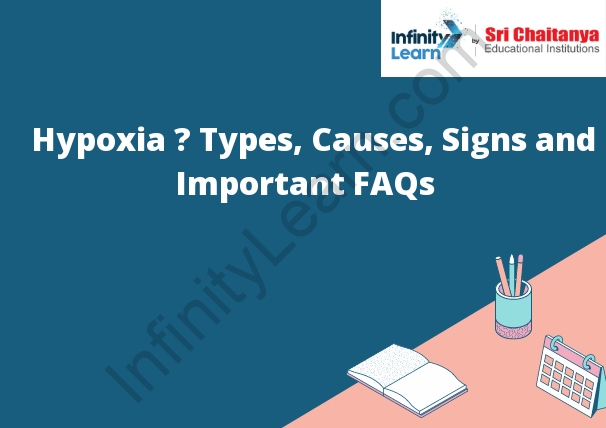Table of Contents
What is Hypoxia?
Hypoxia – Types, Introduction: Hypoxia is a condition where the body or a region of the body is deprived of adequate oxygen supply. This may be due to low oxygen levels in the air, as occurs at high altitudes, or to problems with the lung’s ability to take up oxygen from the air.

Types of Hypoxia
There are four types of hypoxia: hypoxic hypoxia, anemic hypoxia, histotoxic hypoxia, and stagnant hypoxia.
- Hypoxic hypoxia is a lack of oxygen in the blood due to a problem with the lungs. This can be caused by a number of things, including blockages in the airways, diseases of the lungs, and damage to the lungs from smoking or other exposures.
- Anemic hypoxia is a lack of oxygen in the blood due to a low red blood cell count. This can be caused by a number of things, including blood loss, diseases of the red blood cells, and a lack of red blood cells due to malnutrition.
- Histotoxic hypoxia is a lack of oxygen in the blood due to a chemical problem. This can be caused by a number of things, including poisons and drugs.
- Stagnant hypoxia is a lack of oxygen in the blood due to a problem with the circulation. This can be caused by a number of things, including narrowing of the blood vessels, heart disease, and low blood pressure.
Hypoxic Hypoxia
Hypoxic hypoxia is a type of hypoxia that is caused by a lack of oxygen in the tissues. This can be due to a variety of factors, including low blood oxygen levels, an inability of the lungs to take up oxygen, or an inability of the body to use oxygen properly. When the tissues are deprived of oxygen, they can become damaged and may even die. This can lead to a number of health problems, including heart disease, stroke, and organ failure.
Anemic Hypoxia
Anemic hypoxia is a type of hypoxia that is caused by a decrease in the amount of hemoglobin in the blood. Hemoglobin is the molecule in red blood cells that binds to oxygen and carries it to the tissues. When there is a decrease in the amount of hemoglobin, the amount of oxygen that can be carried to the tissues is decreased. This can lead to a decrease in the amount of oxygen that is available to the tissues and can cause tissue hypoxia.
Stagnant Hypoxia
The term stagnant hypoxia refers to a situation where the blood is not able to bring enough oxygen to the tissues. This can be due to a number of factors, including problems with the heart or lungs. When the blood can’t bring enough oxygen to the tissues, those tissues will start to die. This can cause a number of problems, including organ failure.
Histotoxic Hypoxia
Histotoxic hypoxia is a type of hypoxia in which the lack of oxygen is due to the inability of the body to use oxygen to produce energy. This occurs when there is damage to the tissues of the body that are responsible for using oxygen to produce energy. This can be due to damage to the cells themselves, damage to the tissues that support the cells, or damage to the blood vessels that supply the tissues with oxygen.
Metabolic Hypoxia
A state of low oxygen supply to the cells, metabolic hypoxia is caused by factors such as low blood oxygen levels, poor blood circulation, or a lack of oxygen in the air. When the cells are deprived of oxygen, they can’t produce the energy needed for normal function. This can lead to a number of problems, including tissue damage, organ failure, and even death.
Causes of Hypoxia
The causes of hypoxia are many and varied. Some of the more common causes of hypoxia include:
• Pulmonary edema
• Pulmonary embolism
• Bronchoconstriction
• Bronchitis
• Asthma
• Congestive heart failure
• Cardiac arrhythmias
• Anemia
• Pneumonia
• Pulmonary fibrosis
• Sleep apnea
Signs of Hypoxia
The signs and symptoms of hypoxia can vary depending on the severity of the condition and the individual. However, some general signs and symptoms of hypoxia may include:
- Shortness of breath
- Chest pain
- Rapid heart rate
- Anxiety
- Dizziness
- Headache
- Nausea
- Confusion
In extreme cases, hypoxia may lead to coma or death.
How to Treat Hypoxia
If someone is suffering from hypoxia, the first thing to do is move them to an area where there is plenty of oxygen. If there is no oxygen available, use a non-rebreather mask to give the person supplemental oxygen. If the person is unconscious, begin CPR.







